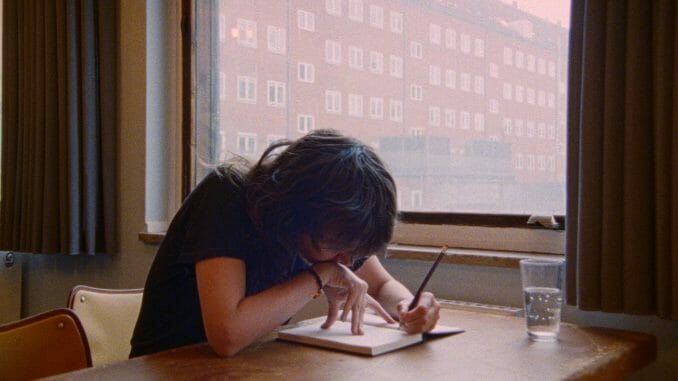Anonymous Club Can’t Crack Courtney Barnett

Australian alt-rock singer/songwriter Courtney Barnett is the focus of Anonymous Club, fellow Aussie filmmaker Danny Cohen’s debut documentary feature. Capturing the artist’s daily experiences (and existential struggles) during the world tour for her 2018 album Tell Me How You Really Feel, the film is best when it focuses on Barnett’s innate musical charm. While Cohen and his subject have collaborated creatively in the past—mostly on music videos—the director keeps his subject at arm’s length, afraid (or simply not equipped) to demystify the musician for a wider audience. Despite gaining intimate access to Barnett, particularly due to Cohen’s one-man shoot, an impenetrable mask remains—a manifestation of the director and subject’s dual aversion to sincere vulnerability. Anonymous Club feels like a prolonged case of sympathetic stage fright.
Filmed by Cohen on lush 16mm, Anonymous Club (named after a song on Barnett’s 2013 EP A Sea of Split Peas) utilizes a clever conceit to get the notoriously shy and cagey Barnett to articulate her thoughts without the comfort of a backing band. She uses a dictaphone as an impromptu diary, spouting her everyday thoughts during a particularly tumultuous time in her life and career. Met with overwhelming critical fanfare in the wake of her second studio album, Barnett becomes overcome with anxiety and self-doubt, unsure of how to navigate what (to her) seems like overblown praise. While these audio diary entries are certainly revealing, Barnett herself recognizes that her songwriting process evokes a candid honesty that she’s frankly unable to disclose through conversation. Particularly because these diary entries are recorded as soliloquies for Cohen’s film, there’s a palpable sense that Barnett is flinching away from her true sentiments, adding a layer of irony to the fact that she’s promoting Tell Me How You Really Feel. Of course, Barnett is more than aware of this paradox.
During the opening scene, a fan approaches Barnett and asks if she can scribble his favorite lyrics of hers on the shirt off his own back: “I’d rather stay in bed with the rain over my head / Than have to pick my brain up off of the floor.”
“These are the lyrics of my life,” the fan beams.
Barnett, completely incapable of occupying the spotlight off-stage, says she hardly remembers the words. What’s more likely, though, is that acknowledging her music’s impact on someone else’s life is far too heavy for her bear.
These are the moments that crystalize Barnett’s interiority; for all of her success, she’s still deeply unsure and insecure. However, this is hardly the revelation the film thinks it is. Any casual fan of Barnett’s knows that her lyrics don’t shy away from addressing her chronically low self-esteem. Tell Me How You Really Feel is rife with these very musings, from the title of the track “Crippling Self Doubt and a General Lack of Confidence” to the lyrics of “Hopefulessness”: “Hardly a maverick / Lesser than average.”
-

-

-

-

-

-

-

-

-

-

-

-

-

-

-

-

-

-

-

-

-

-

-

-

-

-

-

-

-

-

-

-

-

-

-

-

-

-

-

-








































